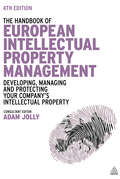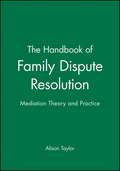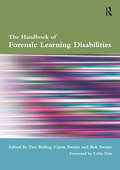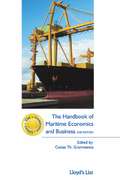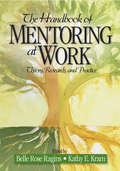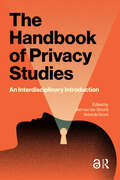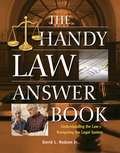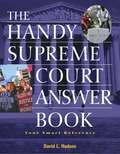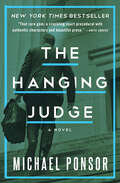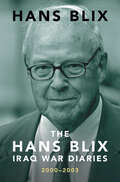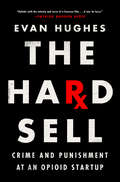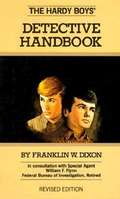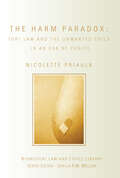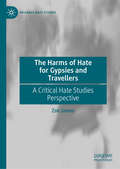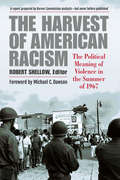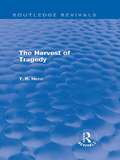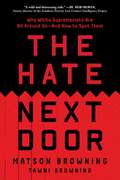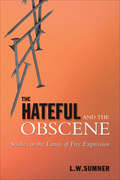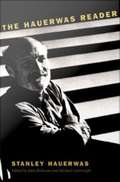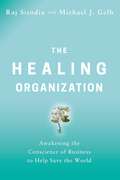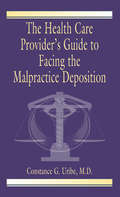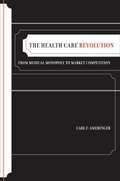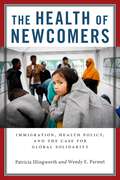- Table View
- List View
The Handbook of European Intellectual Property Management
by Adam JollyWhen managed well, IP can become the most enduring form of competitive advantage, creating streams of revenue well into the future. But for many in Europe, IP can still seem complicated to acquire, expensive to maintain and hard to enforce. Drawing on a wide range of expert contributions, The Handbook of European Intellectual Property Management is a practical and easy-to-follow account of how IP comes into play at various stages of ventures and delivers commercial success and real competitive advantage. Drawing out the commercial implications of the changes that are happening within Europe's framework for innovation, like the arrival of the unitary patent, this Handbook reviews how EU programmes such as Horizon 2020, the Innovation Union and the European Research Area are measuring performance against a target of creating more growth from IP ventures. In parallel, the contributors discuss the new terms on which leading players in business and research are looking to engage partners in sourcing ideas and fast-tracking innovation. Everywhere IP policies are being re-written to encourage open innovation and to source knowledge from wherever it may best be found. For those looking to take an innovation, a design, or a brand into the market, this handbook discusses the options in putting the right idea into the right format, highlighting challenges such as: - how to design an IP strategy - how to capture and secure IP - how to capitalise on new technologies - how to combine different types of IP - whether to adopt a national, European or global focus - how to engage in partnerships and competitions - how to source ideas from the research base - how to retain exclusivity within open innovation - which model to adopt in reaching the market - how to negotiate IP within contracts - how put a value on IP - how to raise funds with IP - how to resolve disputes
The Handbook of Family Dispute Resolution: Mediation Theory and Practice
by Alison TaylorNo matter your profession (attorney, clinician, family therapist)or skill level (seasoned professional or novice), The Handbook ofFamily Dispute Resolution is an invaluable resource that outlinesthe most effective mediation approaches, techniques, and skills. The Handbook of Family Dispute Resolution is a practical andcomprehensive guide that includes * A review of professional ethics and standards * Help for attorneys who are not trained in the skills needed forworking with families * Information about cultural issues that affect families duringmediation * Highlights of key legal and negotiation skills * Guidelines for understanding complex family dynamics andconflicts * A screening tool for evaluating domestic violence * A matrix for starting discussions of parenting plans based onchildren's needs * An examination of specialized practices for family mediation * Direction for assessing one's professional approach to familymediation
The Handbook of Forensic Learning Disabilities
by Bob Swann Tim Riding Caron SwannThis comprehensive and practical guide helps professionals and staff within hospitals change the way they collect record store and use clinical information about patients. It illustrates how clinical governance and evidence-based practice can be easily addressed by modernising clinical information practice to benefit patients and improve staff and service efficiency. As well as helping organisations define and establish improved systems this book is of continuing use for all healthcare professionals who make store and use patient records. 'High quality shared record keeping is recognised as being fundamentally important to good patient care. This book offers an excellent practical approach to addressing the changes needed in clinical record keeping to support improved patient care clinical governance better management information and the move towards electronic patient records. It brings together a strong clinical focus with the informatics principles needed to support a successful move to modern record keeping.' Yvonne Baker and Tricia Woodhead in the Foreword It will be a useful guide for clinicians and all other health professionals dealing with clinical information.
The Handbook of Maritime Economics and Business (The Grammenos Library)
by Costas Th. GrammenosThis book is the founding title in the Grammenos Library. The diversity of the subjects covered is unique and the results of research developed over many years are not only comprehensive, but also have important implications on real life issues in maritime business. The new edition covers a vast number of topics, including: • Shipping Economics and Maritime Nexus • International Seaborne Trade • Economics of Shipping Market and Shipping Cycles • Economics of Shipping Sectors • Issues in Liner Shipping • Economics of Maritime Safety and Seafaring Labour Market • National and International Shipping Policies • Aspects of Shipping Management and Operations• Shipping Investment and Finance • Port Economics and Management • Aspects of International Logistics
The Handbook of Mentoring at Work: Theory, Research, and Practice
by Belle Rose Ragins K. E. Kram"This handbook is remarkable in that it provides a comprehensive and finely nuanced account of the diverse approaches that researchers, theorists,and practitioners have taken to mentoring by incorporating insights of someof the most widely known and respected researchers in careers and in mentoring...This handbook is poised to become a classic in career and mentoring literature with its potential long-term heuristic usefulness in generating new intersections among theory, research, and practice."—Rebecca L. Weiler, Suzy D′Enbeau, Patrice M. Buzzanell, Purdue University"This handbook is poised to become a classic in career and mentoring literature with its potential long-term heuristic usefulness in generating new intersections among theory,research, and practice...it is encouraging that so much of the handbook establishes grounds for future communication research and relates directly to current trends in organizational and managerial communication."—MANAGEMENT COMMUNICATION QUARTERLY"Ragins and Kram—both scholars whose work ignited the field of mentoring some 20 years ago and has guided it ever since—have teamed up to produce this lucid and accessible compendium of research and theory on mentoring relationships at work. Bringing together an impressive group of scholars, this volume offers a comprehensive assessment of the current state of knowledge about mentoring, as well as an ambitious, theory-driven, practice-oriented agenda for future research. This book is an essential resource and could not be more timely as organizational scholars and practitioners alike grapple with the challenges of developing an ever more diverse workforce to meet the needs of an ever more global and technologically sophisticated organizational world." —Robin Ely, Harvard Business School "The most complete [reference] in mentoring. The most seminal thinkers and the most significant collection of essays in print. A must read for everyone concerned with growth and learning." —Warren Bennis, University of Southern California "This book is extremely timely. After two decades of research and debate, it provides a definitive guide to the study and practice of mentoring. In a world of looming talent shortages, it will prove an invaluable resource to reflective practitioners and organizational scholars alike. The authors should be congratulated for offering this tour de force of cutting-edge research and practice on mentoring while also charting new territories for future investigation." —Herminia Ibarra, INSEAD "From two of the leading theorists in the field of mentoring comes an extraordinary volume. Ragins and Kram have guided a stellar group of authors toward new heights in theory and practice. The book covers all the bases and provides multiple perspectives–some entirely new—that promise to be generative of innovative research and practice. No one interested in mentoring, neither scholar nor practitioner, can afford to ignore this remarkable book." —Lotte Bailyn, MIT Sloan School of Management "The explosion of interest in workplace mentoring today cries out for more robust research frameworks as well as new and better practical applications. This superb Handbook closes that gap by bringing together leading scholars and practitioners for a comprehensive overview of this fast-growing phenomenon. Researchers, students, human resources professionals and practicing managers alike–indeed, anyone who has been a mentor or mentee–will find this groundbreaking volume an indispensable companion." —John Alexander, Former President and Senior Advisor, Center for Creative Leadership The Handbook of Mentoring at Work: Theory, Research, and Practice brings together the leading scholars in the field in order to craft the definitive reference book on workplace mentoring. This state-of-the-art guide connects existing knowledge to cutting-
The Handbook of Privacy Studies: An Interdisciplinary Introduction
by Sloot, Bart van der Aviva De GrootThe Handbook of Privacy Studies is the first book in the world that brings together several disciplinary perspectives on privacy, such as the legal, ethical, medical, informatics and anthropological perspective. Privacy is in the news almost every day: mass surveillance by intelligence agencies, the use of social media data for commercial profit and political microtargeting, password hacks and identity theft, new data protection regimes, questionable reuse of medical data, and concerns about how algorithms shape the way we think and decide. This book offers interdisciplinary background information about these developments and explains how to understand and properly evaluate them.The book is set up for use in interdisciplinary educational programmes. Each chapter provides a structured analysis of the role of privacy within that discipline, its characteristics, themes and debates, as well as current challenges. Disciplinary approaches are presented in such a way that students and researchers from every scientific background can follow the argumentation and enrich their own understanding of privacy issues.
The Handbook of Security
by Martin GillThe substantially revised third edition of The Handbook of Security provides the most comprehensive analysis of scholarly security debates and issues to date. It reflects the developments in security technology, the convergence of the cyber and security worlds, and the fact that security management has become even more business focused. It covers newer topics like terrorism, violence, and cybercrime through various offence types such as commercial robbery and bribery. This handbook comprises mostly brand new chapters and a few thoroughly revised chapters, with discussions of the impact of the pandemic. It includes contributions from some of the world's leading scholars from an even broader geographic scale to critique the way security is provided and managed. It speaks to professionals working in security and students studying security-related courses.
The Handy Law Answer Book
by David L HudsonCombining practical legal tips with an exhaustive review of the law in the United States, this comprehensive reference answers more than 1,200 questions ranging from Where did the word tort come from? and How are state court judges selected? to Where did the first U.S. Supreme Court meet? Useful advice includes how to find a lawyer, how to file a complaint against a lawyer, how to document discrimination in the workplace, and how to handle oneself in court. Interspersed throughout are fun sidebars highlighting important cases and explanations of legal terms as well as entertaining information on bizarre and frivolous lawsuits, including one where a prisoner in Colorado sued prison officials after he injured himself during an escape attempt. With a wide range of information suitable for various knowledge bases-from junior high to junior college-this is an ideal source for anyone looking to get a better understanding of the law.
The Handy Supreme Court Answer Book
by David L HudsonFrom the origins of the court to modern practical matters-including the federal judiciary system, the Supreme Court's session schedule, and the argument, decision, and appeal process-this resource provides detailed answers on all aspects of the Supreme Court. Exploring the social, cultural, and political atmosphere in which judges are nominated and serve, this guide book answers questions such as When did the tradition of nine justices on the bench begin? When did the practice of hiring law clerks to assist with legal research and writing begin? and How do cases reach the Supreme Court? Details on historic decisions-including Marbury v. Madison, Brown v. Board of Education, Miranda v. Arizona, and Bush v. Gore-accompany a thorough history of all 17 Supreme Court Chief Justices.
The Hanging Judge: A Novel (The Judge Norcross Novels #1)
by Michael PonsorFrom the author of The One-Eyed Judge: A New York Times–bestselling novel about a federal death penalty trial from the perspective of the presiding judge. When a drive-by shooting in Holyoke, Massachusetts, claims the lives of a drug dealer and a hockey mom volunteering at an inner-city clinic, the police arrest a rival gang member. With no death penalty in Massachusetts, the US attorney shifts the double homicide out of state jurisdiction into federal court so he can seek a death sentence. The Honorable David S. Norcross, a federal judge with only two years on the bench, now presides over the first death penalty case in the state in decades. He must referee the clash between an ambitious female prosecutor and a brilliant veteran defense attorney in a high-stress environment of community outrage, media pressure, vengeful gang members, and a romantic entanglement that threatens to capsize his trial—not to mention the most dangerous force of all: the unexpected. Written by judge Michael Ponsor, who presided over Massachusetts&’s first capital case in over fifty years, The Hanging Judge explores the controversial issue of capital punishment in a dramatic and thought-provoking way that will keep you on the edge of your seat. It is &“a crackling court procedural&” (Anita Shreve) and &“gripping legal thriller&” (Booklist) perfect for fans of Scott Turow.
The Hans Blix Iraq War Diaries: 2000–2003
by Hans BlixThis diary will take the reader back to the pivotal period at the turn of the millennium, when Hans Blix was the UN chief weapons inspector to Iraq, responsible for extensive investigations into the possible existence of weapons of mass destruction. Blix was required to report to the world what he had – and had not – found, under immense time pressure from a broader political context, where the success of the inspections might avert a US-led war. It sheds new light on the intense diplomacy behind the scenes at the UN headquarters in New York and capitals around the world, where Blix met with leaders like US president George Bush, UK prime minister Tony Blair and French president Jacques Chirac. The diary is a valuable historical document of events leading up to the Iraq war, but it can also be read as a guide in practical diplomacy with the highest of stakes.
The Hard Sell: Crime and Punishment at an Opioid Startup
by Evan HughesThe inside story of a band of entrepreneurial upstarts who made millions selling painkillers—until their scheme unraveled, putting them at the center of a landmark criminal trial."A feat of rigorous sleuthing and deft storytelling that unfolds with the velocity and verve of a Scorsese film... A tour de force." —Patrick Radden KeefeJohn Kapoor had already amassed a small fortune in pharmaceuticals when he founded Insys Therapeutics. It was the early 2000s, a boom time for painkillers, and he developed a novel formulation of fentanyl, the most potent opioid on the market. Kapoor, a brilliant immigrant scientist with relentless business instincts, was eager to make the most of his innovation. He gathered around him an ambitious group of young lieutenants. His head of sales—an unstable and unmanageable leader, but a genius of persuasion—built a team willing to pull every lever to close a sale, going so far as to recruit an exotic dancer ready to scrape her way up. They zeroed in on the eccentric and suspect doctors receptive to their methods. Employees at headquarters did their part by deceiving insurance companies. The drug was a niche product, approved only for cancer patients in dire condition, but the company&’s leadership pushed it more widely, and together they turned Insys into a Wall Street sensation. But several insiders reached their breaking point and blew the whistle. They sparked a sprawling investigation that would lead to a dramatic courtroom battle, breaking new ground in the government&’s fight to hold the drug industry accountable in the spread of addictive opioids. In The Hard Sell, National Magazine Award–finalist Evan Hughes lays bare the pharma playbook. He draws on unprecedented access to insiders of the Insys saga, from top executives to foot soldiers, from the patients and staff of far-flung clinics to the Boston investigators who treated the case as a drug-trafficking conspiracy, flipping cooperators and closing in on the key players. With colorful characters and true suspense, The Hard Sell offers a bracing look not just at Insys, but at how opioids are sold at the point they first enter the national bloodstream—in the doctor&’s office.
The Hardy Boys Detective Handbook
by Franklin W. DixonRetired FBI Special Agent William F. Flynn provides young would-be detectives with tips on how to investigate cases just like the Hardy Boys. Includes information on crime solving techniques and how investigations are conducted.
The Harm Paradox: Tort Law and the Unwanted Child in an Era of Choice (Biomedical Law and Ethics Library)
by Nicolette PriaulxOffering the first comprehensive theoretical engagement with actions for wrongful conception and birth, The Harm Paradox provides readers with an insightful critique into the concepts of choice, responsibility and personhood. Raising fundamental questions relating to birth, abortion, family planning and disability, Priaulx challenges the law’s response that enforced parenthood is a harmless outcome and examines the concept of autonomy, gender and women’s reproductive freedom. It explores a wealth of questions, including: Can a healthy child resulting from negligence in family planning procedures constitute ‘harm’ sounding in damages, when so many see its birth as a blessing? Can a pregnancy constitute an ‘injury’ when many women choose that very event? Are parents really harmed, when they choose to keep their much loved but ‘unwanted child’? Why don’t women seek an abortion if the consequences of pregnancy are seen as harmful? An exciting and original contribution to the fields of medical law and ethics, tort law and feminist jurisprudence, this is an excellent resource for both students and practitioners.
The Harms of Hate for Gypsies and Travellers: A Critical Hate Studies Perspective (Palgrave Hate Studies)
by Zoë JamesGypsies and Travellers have often been overlooked as victims of hate crime and discrimination. This book redresses that exclusion by shining a light on the harms of hate experienced by Gypsies and Travellers in the UK. In doing so James explores how hate permeates all aspects of their lives and identifies the hate crimes, incidents, and speech that they are subject to. It goes on to explore how hate against Gypsies and Travellers occurs as discrimination, social exclusion and criminalisation and how that hate is embedded within the language and practice of neoliberal capitalism. This book provides new insights to critical criminology and ways of understanding hate by using the critical hate studies perspective to gain a full appreciation of the harms of hate. As a consequence of this, the book is able to do justice to Gypsies' and Travellers' experiences of hate by extrapolating how harms manifest and the impact they have on Gypsies’ and Travellers’ social and personal identities. The book explains and acknowledges how hate harms imbue Gypsies' and Travellers' daily lives, including common events of serious abuse and assault, regular ill-treatment in provision of services, and everyday micro-aggressions. It argues hate experienced by Gypsies and Travellers can only be fully recognised through an analysis of the neoliberal capitalist context within which it occurs and the harmful subjective experience it engenders. The author’s expertise in this area, having carried out research with Gypsies and Travellers for 25 years, underpins the book with excellent empirical knowledge and research-informed discussion.
The Harvest of American Racism: The Political Meaning of Violence in the Summer of 1967
by Robert ShellowIn the summer of 1967, in response to violent demonstrations that rocked 164 U.S. cities, the National Advisory Commission on Civil Disorders, a.k.a. the Kerner Commission, was formed. The Commission sought reasons for the disturbances, including the role that law enforcement played. Chief among its research projects was a study of 23 American cities, headed by social psychologist Robert Shellow. An early draft of the scientists’ analysis, titled “The Harvest of American Racism: The Political Meaning of Violence in the Summer of 1967,” provoked the Commission’s staff in November 1967 by uncovering political causes for the unrest; the team of researchers was fired, and the controversial report remained buried at the LBJ Presidential Library until now. ? The first publication of the Harvest report half a century later reveals that many of the issues it describes are still with us, including how cities might more effectively and humanely react to groups and communities in protest. In addition to the complete text of the suppressed Harvest report, the book includes an introduction by Robert Shellow that provides useful historical context; personal recollections from four of the report’s surviving social scientists, Robert Shellow, David Boesel, Gary T. Marx, and David O. Sears; and an appendix outlining the differences between the unpublished Harvest analysis and the well-known Kerner Commission Report that followed it. “The [Harvest of American Racism] report was rejected by Johnson administration functionaries as being far too radical—politically ‘unviable’… Social science can play an extremely positive role in fighting racial and other injustice and inequality, but only if it is matched with a powerful political will to implement the findings. That will has never come from within an American presidential administration—that will has only been forged in black and other radical communities’ movements for justice. The political power for change, as incremental as it has been, has come from within those communities. Washington responds, it does not lead." —from the Foreword by Michael C. Dawson
The Harvest of Tragedy (Routledge Revivals)
by Thomas Rice HennUpon initial publication in 1956, this book was an attempt to re-state certain problems concerning the aesthetics and ethics of the tragic form; to examine these in relation to contemporary work in psychology and anthropology; to enquire into the significance of ‘the fact or experience called tragedy’ in the modern world; and to suggest a synthesis in terms of the Christian tradition. This is a reissue of the corrected second edition of the work, first published in 1966.
The Hate Next Door: Undercover within the New Face of White Supremacy
by Matson BrowningThe changing face of hate is on your doorstep…Matt Browning, an undercover detective in Arizona, thought he knew what hate looked like; that is, until he got a front row seat to White supremacy. What followed was a career of hardship and danger, and what he uncovered can no longer go left untold.For more than twenty-five years, Browning has been infiltrating, documenting, and disrupting white supremacy movements from the inside, gaining an intimate vantage point to the KKK, skinheads, border militias, Proud Boys, and other White Power groups, as they organized and grew, their ranks alarmingly including police force and military veterans. Together with his intrepid wife, Tawni, he adopted fake IDs and ideologies, seeking the arrest of its participants—none more so than J.T. Ready, a neo-Nazi who took "hunting trips" for border migrants while gaining mainstream acceptance as a political candidate—and terrorizing Browning's family. What others dismissed as fringe groups, Browning quickly recognized as large and interconnecting organizations permeating into every facet of American society, effectively spreading their dangerous and repugnant rhetoric at unprecedented speeds. Today, after the violent storming of the Capitol on January 6th, the threat posed by these toxic organizations can no longer be ignored by the public at large.In this imperative and gripping narrative, Browning gives readers the inside story of modern-day White supremacy in America in all of its ugly variation. Following his dramatic, high-stakes attempts to take down powerful White supremacists, the torment he faced whilst working undercover, and his eventual creation of the international Skinhead Intelligence Network, The Hate Next Door is a riveting, enlightening, and essential look at the what, where, when, and why of white supremacist groups, how to identify them, and why we must all do everything in our power to fight against them.
The Hateful and the Obscene: Studies in the Limits of Free Expression
by Leonard SumnerIn a series of landmark decisions since 1990, Canadian courts have shaped a distinctive approach to the regulation of obscenity, hate literature, and child pornography. Missing from the debate, however, has been any attempt to determine whether the legal status quo can be justified by reference to a framework of moral/political principles. The Hateful and the Obscene is intended to fill that gap. L.W. Sumner brings philosophical depth and theoretical rigour to some of the most important and difficult questions concerning free expression. Building on a framework set out by J.S. Mill – that a legal restriction of expression is justified only when the expression in question is harmful to others and when the benefits of the restriction will exceed its costs – Sumner shows how the Canadian courts have replicated Mill's framework in their interpretation of the Canadian Charter of Rights and Freedoms. The Hateful and the Obscene is a compelling interpretation of freedom of expression that combines serious philosophical thought with a focus on Canadian law, thus maintaining the breadth to deal with both obscenity and hate literature.
The Hauerwas Reader
by Stanley HauerwasStanley Hauerwas is one of the most widely read and oft-cited theologians writing today. A prolific lecturer and author, he has been at the forefront of key developments in contemporary theology, ranging from narrative theology to the "recovery of virtue. " Yet despite his prominence and the esteem reserved for his thought, his work has never before been collected in a single volume that provides a sense of the totality of his vision. The editors of The Hauerwas Reader, therefore, have compiled and edited a volume that represents all the different periods and phases of Hauerwas's work. Highlighting both his constructive goals and penchant for polemic, the collection reflects the enormous variety of subjects he has engaged, the different genres in which he has written, and the diverse audiences he has addressed. It offers Hauerwas on ethics, virtue, medicine, and suffering; on euthanasia, abortion, and sexuality; and on war in relation to Catholic and Protestant thought. His essays on the role of religion in liberal democracies, the place of the family in capitalist societies, the inseparability of Christianity and Judaism, and on many other topics are included as well. Perhaps more than any other author writing on religious topics today, Hauerwas speaks across lines of religious traditions, appealing to Methodists, Jews, Anabaptists or Mennonites, Catholics, Episcopalians, and others.
The Healer's Power
by Howard BrodyAlthough the physician’s use and misuse of power have been discussed in the social sciences and in literature, they have never been explored in medical ethics until now. <p><p>In this book, Dr. Howard Brody argues that the central task is not to reduce the physician’s power, as others have suggested, but to develop guidelines for its use, so that the doctor shares with the patient both information and the responsibility for deciding on appropriate treatment.
The Healing Organization: Awakening the Conscience of Business to Help Save the World
by Michael J. Gelb Raj SisodiaThe image of modern corporations has been shaped by a profits over people approach, but we are at a point where business must take the lead in healing the crises of our time. The Healing Organization shows how corporations can become healing forces.Conscious Capitalism pioneer Raj Sisodia and organizational innovation expert Michael J. Gelb were inspired to write this book because of the epidemic of unnecessary suffering connected with business, including the destruction of the environment; increasing numbers living paycheck-to-paycheck and barely surviving; and rising rates of depression and stress leading to chronic health problems.Based on extensive in-depth interviews and inspiring case studies, Sisodia and Gelb show how companies such as Shake Shack, Hyatt, KIND Healthy Snacks, Eileen Fisher, H-E-B, FIFCO, Jaipur Rugs and DTE Energy are healing their employees, customers, communities and other stakeholders. They represent a diverse sampling of industries and geographies, but they all have significant elements in common, besides being profitable enterprises:Their employees love coming to work.They have passionately loyal customers.They make a significant positive difference to the communities they serve.They preserve and restore the ecosystems in which they operate.The enmity and dividedness between those who champion unfettered capitalism and those who advocate socialism is exacerbating rather than solving our problems.In a world that urgently needs healing on many levels, this is a movement whose time has come. The Healing Organization shows how it can be done, how it is being done, and how you can begin to do it too.
The Health Care Provider's Guide to Facing the Malpractice Deposition
by Constance G. Uribe M.D.An anesthesiologist chips a patient's tooth during a difficult intubation. A surgeon leaves tiny abrasions on a patient's abdomen during a delicate surgical procedure. And an operating room nurse accidentally nips a patient's finger with a pair of scissors.Not all of these examples of medical mistakes will result in malpractice suits. But for the o
The Health Care Revolution: From Medical Monopoly to Market Competition
by Carl F. AmeringerThis book explains how the revolution of America's market-based health care system came into being when the U.S. Supreme Court and Congress prompted the antitrust agencies of the federal government to change the rules of the health care system. Ameringer lays out the key events that led up to this regime change; explores its broader social, political, and economic contexts; examines the views of both its proponents and opponents; and considers its current trajectory.
The Health of Newcomers: Immigration, Health Policy, and the Case for Global Solidarity
by Patricia Illingworth Wendy E. ParmetImmigration and health care are hotly debated and contentious issues. Policies that relate to both issues—to the health of newcomers—often reflect misimpressions about immigrants, and their impact on health care systems. Despite the fact that immigrants are typically younger and healthier than natives, and that many immigrants play a vital role as care-givers in their new lands, native citizens are often reluctant to extend basic health care to immigrants, choosing instead to let them suffer, to let them die prematurely, or to expedite their return to their home lands. Likewise, many nations turn against immigrants when epidemics such as Ebola strike, under the false belief that native populations can be kept well only if immigrants are kept out. In The Health of Newcomers, Patricia Illingworth and Wendy E. Parmet demonstrate how shortsighted and dangerous it is to craft health policy on the basis of ethnocentrism and xenophobia. Because health is a global public good and people benefit from the health of neighbor and stranger alike, it is in everyone’s interest to ensure the health of all. Drawing on rigorous legal and ethical arguments and empirical studies, as well as deeply personal stories of immigrant struggles, Illingworth and Parmet make the compelling case that global phenomena such as poverty, the medical brain drain, organ tourism, and climate change ought to inform the health policy we craft for newcomers and natives alike.
